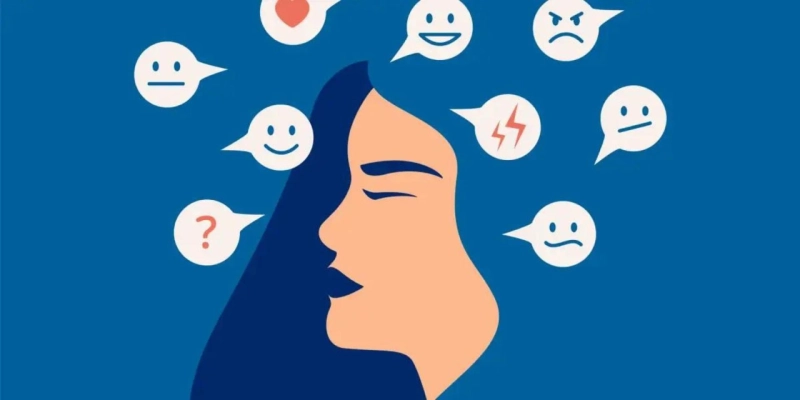Generally feeling low or testy is a very common symptom during periods. But, the last thing any of us want to hear is someone asking if it’s “your time of the month?” This does not sound so pinching on any regular days, but when you are on your period, this might start a war.
The psychology of menstruation refers to the emotional, cognitive, and behavioral aspects that can be influenced by the menstrual cycle. During this time, hormonal fluctuations, particularly estrogen and progesterone, can impact mood, energy levels, and cognition. Some women may experience premenstrual syndrome (PMS), characterized by mood swings, irritability, or fatigue. Additionally, menstruation can affect body image and self-esteem.
Are there any other factors?
On the other hand, social and cultural factors can also play an important role, as menstrual stigma or taboos may influence how individuals perceive and cope with their menstruation cycle. It is crucial to acknowledge that experiences vary extensively between individuals, and not everyone will be affected in the same way. That is why open communication, education about menstrual pads and menstruation in general, and support are important in understanding and managing the psychological aspects and to deal with mental health issues properly.
As said earlier, during menstruation, emotional and mental health can be influenced by hormonal changes and various psychosocial factors. Here are some key aspects to understand:
Hormonal Influences
We all know that the menstrual cycle is driven by hormones. The fluctuation of hormones, particularly in estrogen and progesterone, can impact neurotransmitters in the brain - such as serotonin which in turn affects mood and emotions. For some individuals, this may lead to mood swings, irritability, anxiety, sadness or even depression during their menstrual cycle.
Premenstrual Syndrome (PMS):
PMS is a common condition that includes a variety of physical and emotional symptoms experienced by some women in the days leading up to menstruation. Emotional changes during this time may include mood swings, bloating, fatigue, and changes in appetite. Physical symptoms include experiencing menstrual cramps, tenderness in breasts and others. It is also noteworthy that these symptoms can vary in intensity and duration from person to person.
Premenstrual Dysphoric Disorder (PMDD):
Although a small number of individuals experience it, PMDD is a more severe form of PMS. It involves intense mood swings, irritability, and severe period cramps that can significantly impact daily functioning.
Coping with Physical Symptoms:
The menstrual cramps such as discomfort, bloating, fatigue and breast tenderness can contribute a lot to emotional and mental challenges during menstruation. This can have a serious impact as dealing with these physical issues can influence one's emotional well-being and mental health in many ways. The experience of pain or discomfort may add to feelings of frustration, irritability, or even anxiety. While managing these physical symptoms can help improve overall emotional well-being.
Another way of coping with these symptoms is to use reliable sanitary pads so you do not have to worry about leakage, irritation or rash at least. For this, you can go through the Butterfly website where you can get a variety of options. However, we recommend you choose Butterfly Breathable Ultra-Thin Cottony Sanitary Pads. These pads ensure a cottony-soft comfort because of the soft top sheet. These offer easy period management with leak-free protection with their cottony wings and quick absorbing layer.
Body Image and Self-Esteem:
Hormonal changes and physical changes related to monthlies may affect body image and self-esteem. This can seriously affect your mental health which is why it is crucial to cope with it. To solve it, cultivating a positive body image and self-acceptance can do wonders. Moreover, getting help from support groups or your loved ones can also help a lot. Furthermore, choosing the right type of women's pad for a period can also help boost your self-esteem and confidence
For instance, choosing a sanitary napkin like Butterfly Breathable Ultra-Thin Dry Mesh Sanitary Pads can help you enjoy your days without any worry. You can forget leakage or irritation as these pads have special leak guards and wings to keep them in place.
Social and Cultural Factors:
Societal expectations and cultural beliefs surrounding menstruation can also influence emotional and mental health in a lot of ways. This is true that societal attitudes, cultural beliefs, and menstrual stigma attached to it can affect how individuals perceive and deal with menstruation. If we talk about taboos, we see how individuals lead to negativity in many cultures. Addressing these factors can be beneficial in supporting emotional well-being.
Let's discuss the coping strategies!
Let's start with the basics. The most important first step is to engage in self-care practices, such as regular exercise, relaxation techniques, maintaining a balanced diet, and seeking social support. This may not be the only step you take but is certainly a very important one. This can help manage emotional and mental health during menstruation.
Apart from this, seeking support from loved ones, or considering joining support groups is also encouraged. Here, you can deal with issues like depression, anxiety and general well-being easily. Additionally, maintaining a balanced diet, getting enough sleep, and managing stress levels can also contribute positively to emotional and mental well-being.
What's more?
It is also important to note that menstruation can accelerate pre-existing mental health conditions, such as depression or anxiety, potentially exacerbating symptoms. This is why do not take it all lightly and start taking measures beforehand.
If emotional or mental health challenges during menstruation significantly impact daily life, it is also advisable to seek support from healthcare professionals, such as gynecologists. Moreover, open discussion about the right menstrual products and issues related to periods can also help individuals a lot.
Let's wrap it up!
It is worth noting that emotional and mental health experiences during a period can vary significantly among individuals. While some people may experience minimal disruptions, others may undergo more intense emotional or mental health challenges. No matter the intensity, it is important to consider, acknowledge and cope with these issues.


